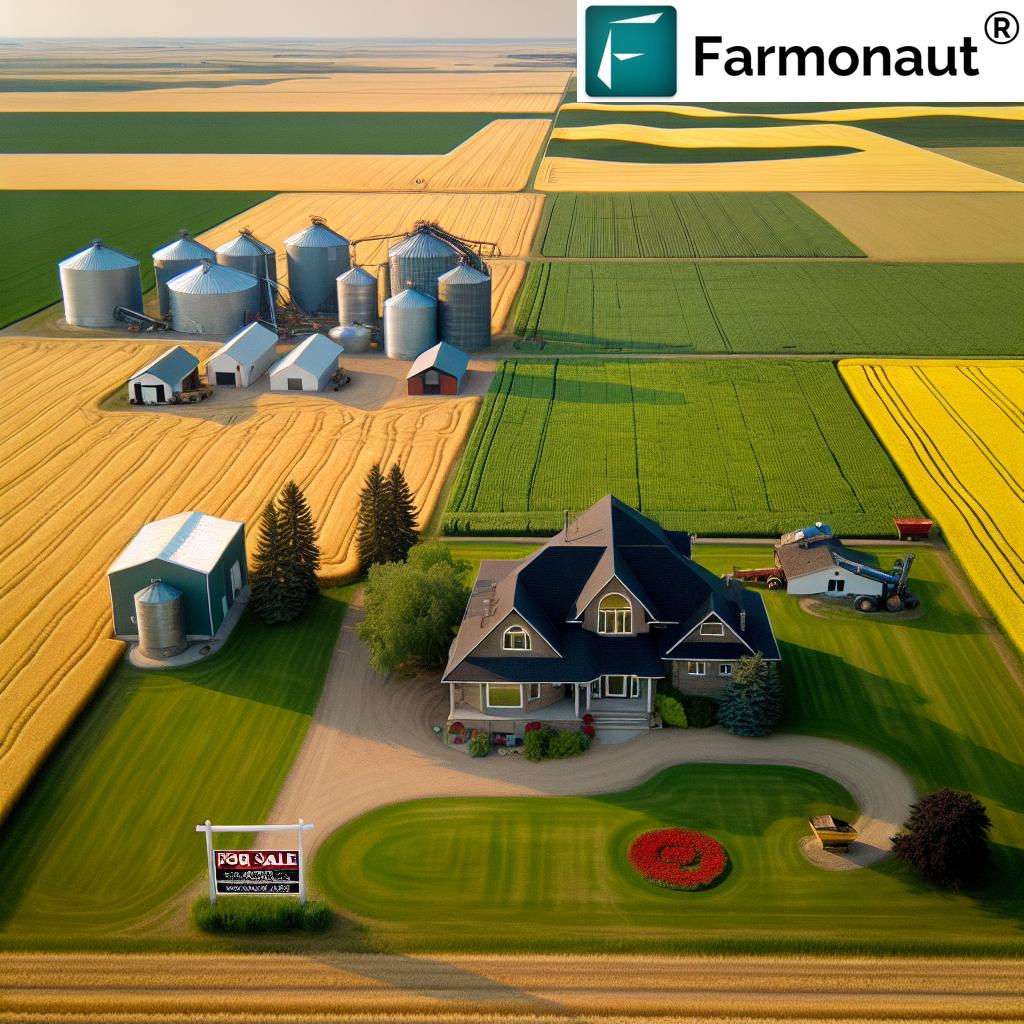Unlocking Manitoba’s Agricultural Real Estate: Expert Strategies for Farm Property Investments
“Manitoba’s agricultural real estate market includes over 17 million acres of farmland, making it a significant investment opportunity.”
Welcome to our comprehensive guide on Manitoba’s thriving agricultural real estate market. As experts in the field, we’re excited to share our insights and strategies for navigating farm property investments in this dynamic region. Whether you’re a seasoned farmer looking to expand your operations or a first-time investor exploring the potential of rural properties, this article will provide you with the knowledge and tools you need to make informed decisions.
In today’s ever-evolving agricultural landscape, understanding the intricacies of farm real estate is crucial. From crop farm listings to dairy farm real estate opportunities, we’ll explore the diverse range of properties available in Manitoba and discuss how precision agriculture technology is reshaping the industry. Our goal is to equip you with expert strategies for success in this exciting market.

The Manitoba Agricultural Real Estate Landscape
Manitoba’s agricultural sector is a cornerstone of the province’s economy, boasting a diverse range of farming operations and abundant natural resources. Let’s delve into the key aspects that make this region a prime location for farm property investments:
- Rich and Diverse Farmland: Manitoba offers a variety of soil types suitable for different crops, from the fertile Red River Valley to the rolling prairies.
- Favorable Climate: The region’s climate supports a wide range of agricultural activities, including grain, oilseed, and livestock production.
- Strategic Location: Proximity to major transportation routes and markets enhances the value of Manitoba’s agricultural properties.
- Technological Advancements: The adoption of precision agriculture and other innovative farming techniques is on the rise, boosting productivity and efficiency.
As we explore the Manitoba farmland listings, it’s important to consider these factors and how they contribute to the overall value and potential of agricultural properties in the region.
Types of Agricultural Properties in Manitoba
Manitoba’s agricultural real estate market offers a diverse range of property types to suit various farming needs and investment strategies. Here’s an overview of the main categories you’ll encounter in your search:
- Crop Farms: These properties are primarily dedicated to growing field crops such as wheat, canola, soybeans, and corn. They often feature large acreages with high-quality soil and modern irrigation systems.
- Dairy Farms: Specialized properties equipped for milk production, including barns, milking parlors, and pastures for grazing.
- Livestock Farms: Ranches and farms suitable for raising cattle, hogs, or poultry, with appropriate facilities and grazing land.
- Mixed-Use Farms: Properties that combine crop production with livestock operations, offering diversification opportunities.
- Specialty Farms: These may include orchards, vegetable farms, or niche operations like apiaries or organic farms.
- Recreational Land: Properties that combine agricultural use with recreational opportunities such as hunting, fishing, or eco-tourism.
Understanding the unique characteristics and potential of each property type is crucial when considering agricultural real estate investments in Manitoba.
Market Trends and Valuation Factors
To make informed decisions in Manitoba’s agricultural property market, it’s essential to understand the current trends and factors affecting land values. Here are some key considerations:
- Commodity Prices: The value of agricultural land is closely tied to crop and livestock prices. Higher commodity prices generally lead to increased land values.
- Soil Quality: Properties with fertile, well-drained soil command higher prices due to their potential for higher yields.
- Water Access: Reliable water sources for irrigation can significantly increase a property’s value and productivity.
- Infrastructure: Proximity to transportation networks, grain elevators, and processing facilities adds value to farm properties.
- Technological Improvements: Farms equipped with modern precision agriculture technology often fetch higher prices.
- Environmental Factors: Sustainable farming practices and conservation efforts can enhance long-term property value.
By keeping these factors in mind, investors can better assess the potential of various agricultural properties and make strategic decisions in the Manitoba market.
“Precision agriculture technology has increased farm productivity in Manitoba by up to 15% in the last decade.”
The Role of Technology in Modern Farming
In recent years, technological advancements have revolutionized the agricultural industry, and Manitoba farms are no exception. Precision agriculture technology has become a game-changer, offering numerous benefits to farmers and investors alike:
- Satellite-Based Crop Monitoring: Advanced systems like Farmonaut provide real-time data on crop health, soil moisture, and other critical metrics.
- AI-Driven Advisory Systems: Artificial intelligence tools offer personalized recommendations for crop management and resource allocation.
- Drone Technology: Unmanned aerial vehicles assist in field mapping, crop scouting, and precision spraying.
- IoT Sensors: Internet of Things devices monitor soil conditions, weather patterns, and equipment performance.
- Blockchain for Traceability: This technology ensures transparency in supply chains, enhancing food safety and consumer trust.
When evaluating agricultural properties in Manitoba, consider the level of technological integration as a key factor in determining long-term value and potential returns on investment.

Investment Strategies for Manitoba’s Agricultural Real Estate
Investing in Manitoba’s farm properties requires a well-thought-out strategy. Here are some expert approaches to consider:
- Diversification: Spread your investments across different types of agricultural properties to minimize risk.
- Value-Add Opportunities: Look for properties with potential for improvements or expansion that can increase their value.
- Sustainable Farming Practices: Invest in properties that implement or have the potential for eco-friendly farming methods, which can lead to long-term benefits.
- Technology Integration: Prioritize farms that have adopted or are ready to implement precision agriculture technologies.
- Location Analysis: Consider properties near growing urban centers or in areas with planned infrastructure developments.
- Partnerships: Explore opportunities to partner with experienced local farmers or agricultural cooperatives.
By applying these strategies, investors can maximize their chances of success in Manitoba’s agricultural real estate market.
Navigating Manitoba Farmland Listings
When searching for agricultural properties in Manitoba, it’s crucial to approach the process systematically. Here are some tips to help you navigate farmland listings effectively:
- Utilize Online Resources: Take advantage of specialized real estate websites and apps that focus on agricultural properties.
- Work with Local Experts: Partner with real estate agents who have specific experience in Manitoba’s farm property market.
- Attend Agricultural Events: Farm shows and auctions can be excellent sources of information and networking opportunities.
- Conduct Thorough Due Diligence: Investigate soil quality, water rights, zoning regulations, and any potential environmental issues.
- Consider Future Development: Evaluate properties not just for their current use but also for potential future value.
By following these guidelines, you’ll be better equipped to find the right agricultural property that aligns with your investment goals.
The Impact of Government Policies and Regulations
Understanding the regulatory landscape is crucial when investing in Manitoba’s agricultural real estate. Key areas to consider include:
- Land Use Policies: Familiarize yourself with zoning laws and restrictions on land use.
- Environmental Regulations: Be aware of conservation requirements and sustainable farming practices.
- Foreign Ownership Rules: Understand the regulations regarding non-resident ownership of farmland in Manitoba.
- Agricultural Support Programs: Research available government subsidies and support programs for farmers.
- Tax Considerations: Explore potential tax benefits and obligations related to agricultural property ownership.
Staying informed about these policies and regulations will help you make compliant and strategic investment decisions in Manitoba’s agricultural sector.
Financing Options for Agricultural Real Estate
Securing the right financing is a critical step in agricultural property investment. Here are some options to consider:
- Farm Credit Canada (FCC): A leading agricultural lender offering specialized financing solutions.
- Traditional Bank Loans: Many Canadian banks offer agricultural loan products with competitive rates.
- Government-Backed Programs: Explore federal and provincial programs designed to support farm ownership.
- Private Lenders: Some investors may find flexible terms through private lending institutions.
- Vendor Financing: In some cases, property sellers may offer financing options to buyers.
It’s important to carefully evaluate each financing option and choose the one that best aligns with your investment strategy and financial situation.
Risk Management in Agricultural Real Estate
Investing in farm properties comes with unique risks. Here are some strategies to mitigate these challenges:
- Crop Insurance: Protect against yield losses due to weather events or other unforeseen circumstances.
- Diversification: Spread risk by investing in different types of crops or agricultural activities.
- Weather Monitoring: Utilize advanced weather forecasting tools to make informed decisions.
- Sustainable Practices: Implement conservation techniques to preserve soil health and productivity.
- Market Analysis: Stay informed about commodity price trends and market demands.
- Technology Adoption: Embrace precision agriculture tools to optimize resource use and increase efficiency.
By implementing these risk management strategies, investors can protect their agricultural real estate investments and ensure long-term success.
The Future of Manitoba’s Agricultural Real Estate
As we look ahead, several trends are shaping the future of Manitoba’s agricultural property market:
- Increasing Demand for Sustainable Farms: Properties that demonstrate eco-friendly practices are likely to see higher demand.
- Technology Integration: Farms equipped with advanced precision agriculture tools will command premium prices.
- Diversification of Crops: Climate change may lead to new crop opportunities, influencing property values.
- Urban Expansion: The growth of cities may impact agricultural land use and values near urban centers.
- Global Market Influences: International trade policies and global food demand will continue to affect local farm values.
Staying informed about these trends will help investors make forward-thinking decisions in Manitoba’s agricultural real estate market.
Leveraging Technology for Farm Management
In today’s digital age, leveraging technology is crucial for successful farm management and investment. Farmonaut offers cutting-edge solutions that can significantly enhance your agricultural operations:
- Satellite-Based Crop Monitoring: Get real-time insights into crop health and soil conditions.
- AI-Powered Advisory: Receive personalized recommendations for optimal farm management.
- Blockchain Traceability: Ensure transparency and security in your agricultural supply chain.
- Resource Management Tools: Optimize your use of water, fertilizers, and other inputs.
By integrating these advanced technologies, you can make data-driven decisions that improve productivity and profitability on your Manitoba farm property.
Explore Farmonaut’s solutions:
Manitoba Agricultural Real Estate Investment Comparison
| Property Type | Avg. Price/Acre (CAD) | Typical Farm Size (Acres) | Primary Crops/Livestock | Soil Quality Rating | Irrigation | Proximity to Markets (km) | Potential ROI (%) | Tech Adoption | Environmental Considerations |
|---|---|---|---|---|---|---|---|---|---|
| Crop Farm | 3,000 – 5,000 | 1,000 – 3,000 | Wheat, Canola, Soybeans | High | Yes | 50 – 200 | 5 – 8 | High | Soil Conservation |
| Dairy Farm | 4,000 – 6,000 | 300 – 800 | Dairy Cattle | Medium-High | Partial | 30 – 150 | 6 – 10 | Medium-High | Manure Management |
| Recreational Land | 1,500 – 3,000 | 100 – 500 | Mixed Use | Variable | No | 100 – 300 | 3 – 6 | Low | Wildlife Conservation |
Conclusion
Manitoba’s agricultural real estate market offers a wealth of opportunities for investors and farmers alike. By understanding the diverse property types, market trends, and technological advancements shaping the industry, you can make informed decisions that yield long-term success. Remember to leverage tools like Farmonaut’s precision agriculture solutions to optimize your farming operations and stay ahead in this dynamic market.
Whether you’re considering crop farms, dairy operations, or recreational land, Manitoba’s rich agricultural landscape has something to offer. With the right strategies, careful planning, and a commitment to sustainable practices, your investment in Manitoba’s farm properties can flourish for generations to come.
FAQ Section
Q: What are the main types of agricultural properties available in Manitoba?
A: Manitoba offers a diverse range of agricultural properties, including crop farms, dairy farms, livestock ranches, mixed-use farms, specialty farms (e.g., orchards, organic farms), and recreational land with agricultural potential.
Q: How has precision agriculture technology impacted farm productivity in Manitoba?
A: Precision agriculture technology has significantly boosted farm productivity in Manitoba, with estimates suggesting up to a 15% increase in the last decade. These technologies include satellite-based crop monitoring, AI-driven advisory systems, and advanced resource management tools.
Q: What factors should I consider when evaluating agricultural real estate in Manitoba?
A: Key factors to consider include soil quality, water access, proximity to markets, existing infrastructure, technological integration, commodity prices, and environmental considerations. It’s also important to understand local zoning laws and agricultural policies.
Q: Are there financing options specifically for agricultural property investments in Manitoba?
A: Yes, there are several financing options available, including loans from Farm Credit Canada (FCC), traditional bank loans with agricultural focus, government-backed programs, and in some cases, vendor financing. It’s important to explore multiple options to find the best fit for your investment strategy.
Q: How can I leverage technology like Farmonaut in managing my agricultural property investment?
A: Farmonaut offers advanced tools for satellite-based crop monitoring, AI-powered advisory services, and resource management. These technologies can help you optimize crop yields, reduce input costs, and make data-driven decisions for your farm operations.
For more information on Farmonaut’s agricultural solutions, visit our API page or check out our API Developer Docs.






